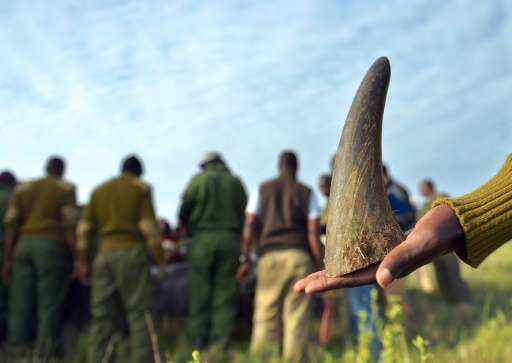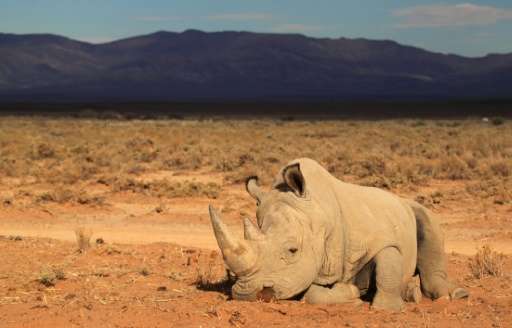South African judge lifts domestic ban on rhino horn trade

A South African judge on Thursday lifted a domestic ban on trade in rhino horns, alarming conservationists who described it as an "extremely dangerous move" that could worsen a poaching crisis.
The government said it planned to appeal against the ruling, which was delivered in the Pretoria High Court after two South African game breeders fought a legal battle to overturn the moratorium.
The court decision came ahead of a meeting in Johannesburg next year of the Convention on International Trade in Endangered Species of Wild Fauna and Flora (CITES), which could lift the global ban.
South Africa's rhino poaching epidemic saw a record 1,215 rhino killed last year for their horn, and some private rhino breeders say selling legally-harvested horns could stifle the lucrative black market trade.
Rhinos are slaughtered by poachers for their horn, which is used as a traditional medicine in east Asia.
Legally dehorning a rhino would see a farm owner put the animal under anaesthesia then saw off the horn, which is composed of keratin, the same material as fingernails.
"Lifting the ban is an extremely dangerous move," Jason Bell, director of International Fund for Animal Welfare (IFAW) in South Africa, told AFP.
"It is setting an unnecessary precedent by allowing domestic trading of horns even though the horns won't be allowed to leave the country.
"If the international ban is lifted, history has shown that poaching and illicit trade will increase dramatically.
"The rhino population will disappear in two to three years if the Chinese consumption continues at the rate that it is today."

Bell dismissed as "disingenuous" claims that legalised trade in horns could end poaching.
Sharp rise in poaching
John Hume and Johan Kruger, the two game breeders who launched the legal action, say it is their constitutional right to sell rhino horn—what they describe as a renewable resource.
"Hopefully this will bring about a change and lead the way to what happens in September next year at CITES," said Izak du Toi, one of Hume's lawyers.
"We believe the South African government is seriously contemplating making a proposal to CITES to allow international trade in rhino horns.
"(Hume) hopes that a legalised trade will lead to a reduction in poaching."
Hume is the world biggest rhino breeder, with about 1,200 rhinos on several ranches in South Africa, and he has more than four tons of rhino horn in secure storage, his lawyer told AFP.
The environment ministry said that the court's order would be suspended as soon as the government lodged its appeal.
"In the absence of the moratorium, it must be emphasised that all trade in rhino horn will be subject to the issuing of the relevant permits," it said.
South Africa is home to around 20,000 rhino, or 80 percent of the world population.
The number of rhino killed rocketed from 13 in 2007 to 1,215 last year.
The judge said the moratorium had been lifted because the government had not followed correct legal procedures and had not consulted the public.
"The pro-trade lobby will see it as quite a big win for themselves, but who are they going to sell it to? The South African market doesn't consume," said leading anti-trade lobbyist Dex Kotze.
He said that if global trade were legalised "demand will outstrip supply by hundreds of tonnes".
"This step is being considered for financial rather than conservation reasons," said the Save The Rhino group in an email.
The decision came after a northern white rhino—one of just four remaining worldwide—died Sunday at the San Diego Zoo in the United States.
© 2015 AFP



















